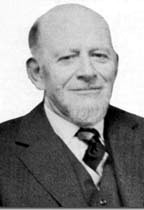| Profile | Major Works | Resources |
Ludwig M. Lachmann, 1906-1990.

German Austrian School economist.
The German economist Ludwig Lachmann was trained in the German Historical tradition, obtaining his degree at the University of Berlin under Werner Sombart in 1930. With the ascent of the Nazis in 1933, Lachmann left Germany, and emigrated to England, enrolling at the London School of Economics (L.S.E). At the LSE, Lachmann quickly came under the spell of Friedrich Hayek and firm convert to the Austrian School. A research fellowship allowed him to visit the United States, where Lachmann attended Knight's seminar at Chicago. In 1943, Lachmann taught economics at the Univeristy of Hull (UK). In 1948, Lachmann moved to the Republic of South Africa, to take up a position as professor of economics at the University of Witswatersrand, a position he would hold until his retirement. In the latter part of his career, he taught the occasional semester at NYU.
Devoutly dedicated to Menger's original vision of an entirely subjective economics, Lachmann attempted to detach the Austrian paradigm from its Walrasian and Jevonian companions. His early training at the hands of Werner Sombart and his prediliction for Weber had a methodological effect: Austrian Theory, Lachmann concluded, was to be characterized as a "genetic-causal" approach, a "verstende" view of social science to be wrought against the mathematical-functional, equilibrium, perfect- foresight approach of mainstream Neoclassical economics.
The "fundentalist Austrianism" of Lachmann was unique at the time - none of the then living Austrian economists really acknowledged their work to be as different from the mainstream as Lachmann claimed. But his work stressed all the points he thought distinctive: subjectivism, expectations, uncertainty, the Hayekian cycle, time-defined capital, methodological individualism, alternative cost and, above all, "market process". Although Lachmann was effectively "exiled" from economics while at Witwatersrand in South Africa, his work was highly influential upon the later "American branch" of the Austrian School. His work on capital theory (1956) resonates issues which were soon to be taken up in the Cambridge Capital Controversy.
|
Major works of Ludwig M. Lachmann
|
|
HET
|
|
Resources on Ludwig Lachmann
|
All rights reserved, Gonçalo L. Fonseca
